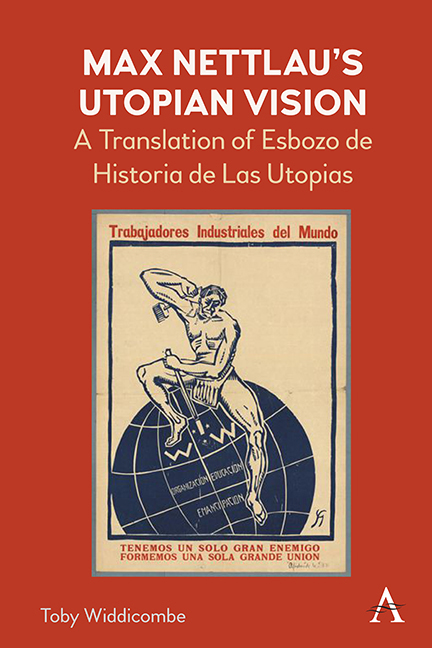Book contents
- Frontmatter
- Dedication
- Contents
- Preface
- Acknowledgments
- Introduction
- Outline of the History of Utopias
- 1 Definition
- 2 The Classical and Medieval Ages
- 3 The Renaissance and Neo-Classical Periods
- 4 The Nineteenth Century (to 1888)
- 5 1888 to the Twentieth Century
- 6 The Twentieth Century: 1900–1925
- Notes
- Appendix A Select Nettlau Bibliography
- Appendix B An Annotated Gazetteer of Nettlau’s Utopians
- Appendix C List of Intentional Communities in Esbozo
- Appendix D List of Utopian Newspapers and Journals in Esbozo
- Bibliography
- Index
6 - The Twentieth Century: 1900–1925
Published online by Cambridge University Press: 18 November 2023
- Frontmatter
- Dedication
- Contents
- Preface
- Acknowledgments
- Introduction
- Outline of the History of Utopias
- 1 Definition
- 2 The Classical and Medieval Ages
- 3 The Renaissance and Neo-Classical Periods
- 4 The Nineteenth Century (to 1888)
- 5 1888 to the Twentieth Century
- 6 The Twentieth Century: 1900–1925
- Notes
- Appendix A Select Nettlau Bibliography
- Appendix B An Annotated Gazetteer of Nettlau’s Utopians
- Appendix C List of Intentional Communities in Esbozo
- Appendix D List of Utopian Newspapers and Journals in Esbozo
- Bibliography
- Index
Summary
I come now to utopias written from the turn of the century until the First World War. This period I see as characterized above all by the numerous utopian publications of H. G. Wells.
This man of great talent has written more utopias than any other writer, except Jules Verne—whom I cannot take seriously. Wells knew how to persuade the public through fantasy combined with a well-respected talent for sociology. However, he abused the poor utopia that had created his reputation by writing one after another, and still he continued to write them as they had become a way of making money for him. The public indulged in the game of reading them just as at another time they might play with a kaleidoscope. Another version of utopia is found in each new book from Wells. Utopia, however, doesn't deserve this treatment, for in the most difficult times it has been a way in which an individual fantasy finds a voice and makes itself heard. The utopian, as an honest man, is only one voice. Most often they make their confession to the public just once through a utopia. Then, in later works, they explain their idea, develop their idea, or retire from writing. On occasion, utopian writers do lose their faith and can only regain it by writing a new utopia. Utopias are often written, as it were, with the heart's blood and are preceded—if they are worth anything—by laborious thought. A utopia establishes its fundamental idea and then set dresses it, as appropriate, with a fantastic framework so as to make it attractive to the public. This was, as the previous chapters have shown, a creative habit of old, and the process was respected until Wells came along. Bellamy wrote his first, then his second book, and then one hundred explanatory articles before retiring and dying. By contrast, Wells wrote a new utopia almost every year. It is the utopia commercialized, paid for, exploited. It is exploited, ironically, when so many other utopians felt inspired to try to put an end to exploitation and make the world free and beautiful. This relationship is mirrored by the decline in intellectual life in the years before the war, years that saw the commercialization and brutalization of culture—and that process had to end in catastrophe.
- Type
- Chapter
- Information
- Max Nettlau's Utopian VisionA Translation of Esbozo de Historia de Las Utopias, pp. 59 - 74Publisher: Anthem PressPrint publication year: 2023



